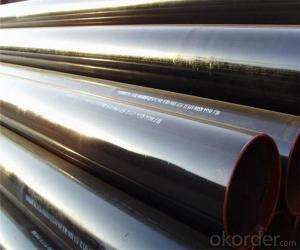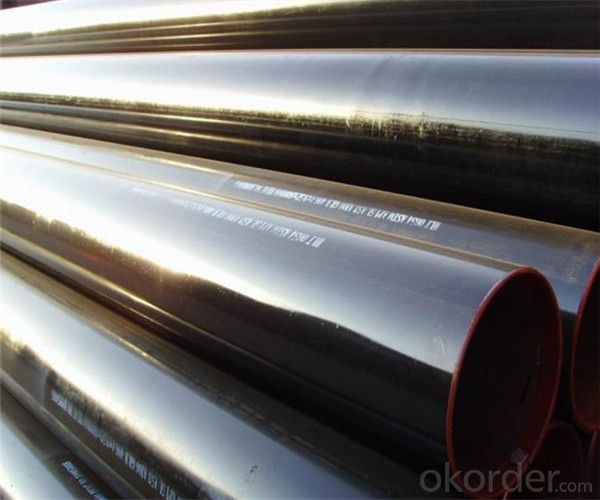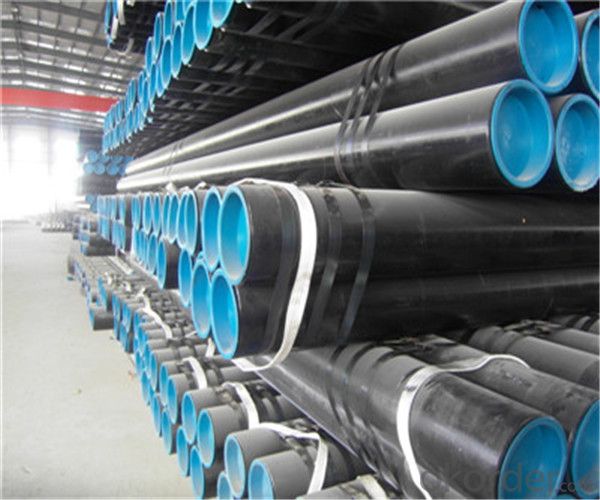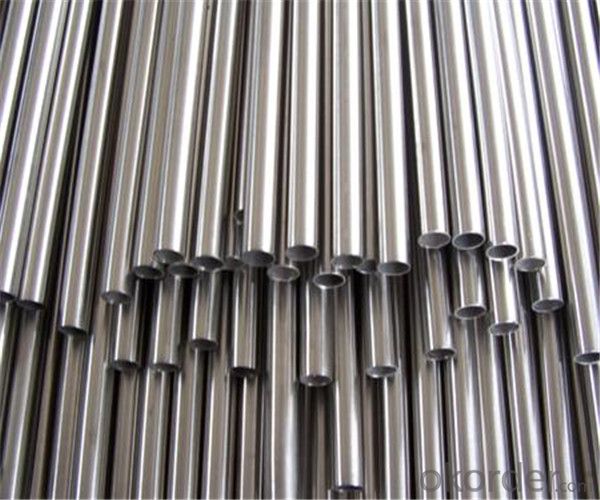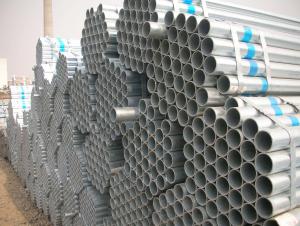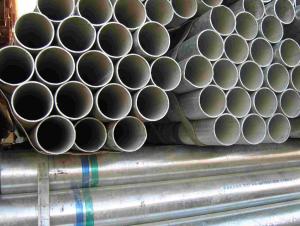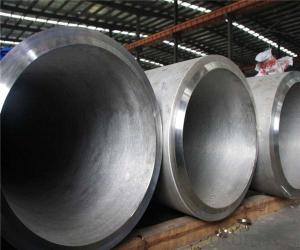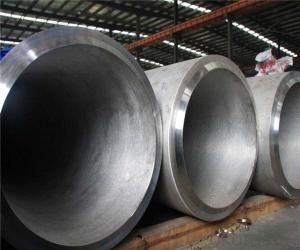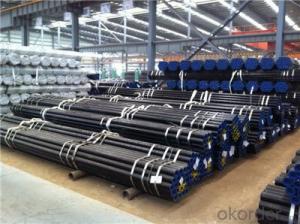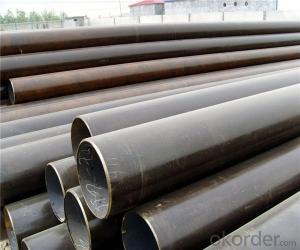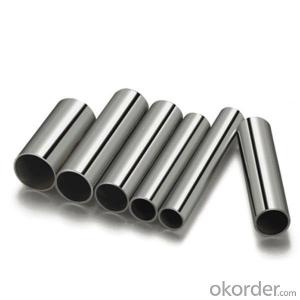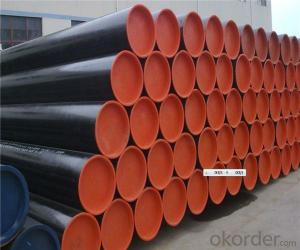High Quality Seamless Steel Pipe from CNBM International Group
- Loading Port:
- Tianjin
- Payment Terms:
- TT OR LC
- Min Order Qty:
- 100 m.t.
- Supply Capability:
- 200000 m.t./month
OKorder Service Pledge
OKorder Financial Service
You Might Also Like
PRODUCT DETAILS
1.Structure of Seamless Steel Pipe Description:
A large amount of Seamless Steel Pipes is offered to the clients at cost effective rates. These pipes are extremely durable, resistant to corrosion and have high tensile strength. Our pipes are used in nuclear plants, power plants, refineries and construction industry across the country. Furthermore, we are capable of providing these seamless pipes to the clients in bulk quantity.
2.Main Features of the Steel Pipe:
• High manufacturing accuracy
• High strength
• Small inertia resistance
• Strong heat dissipation ability
• Good visual effect
•Reasonable price
3.Packaging & Delivery:
| Packaging Details: | Seaworthy packages, bundles wrapped with strong steel strip |
| Delivery Detail: | 15-30 days after received 30% TT |
4.Seamless Steel Pipe Specification:
| Standard: | GB, DIN, ASTM,ASME, ASTM A106-2006, ASTM A53-2007 |
| Grade: | 10#,20#, 45#, 16Mn |
Thickness: | 8 - 33 mm |
| Section Shape: | Round |
| Outer Diameter: | 133 - 219 mm |
| Place of Origin: | Shandong, China (Mainland) |
| Secondary Or Not: | Non-secondary |
| Application: | Hydraulic Pipe |
| Technique: | Cold Drawn |
| Certification: | API |
| Surface Treatment: | factory state or painted black |
| Special Pipe: | API Pipe |
| Alloy Or Not: | Non-alloy |
| Length: | 5-12M |
| Outer Diameter: | 21.3-610mm |
5.FAQ of Seamless steel pipe:
①How is the quality of your products?
Our products are manufactured strictly according to national and internaional standard, and we take a test
on every pipe before delivered out. If you want see our quality certifications and all kinds of testing report, please just ask us for it.
Guaranteed: If products’ quality don’t accord to discription as we give or the promise before you place order, we promise 100% refund.
②How about price?
Yes, we are factory and be able to give you lowest price below market one, and we have a policy that “ for saving time and absolutely honest business attitude, we quote as lowest as possible for any customer, and discount can be given according to quantity”,if you like bargain and factory price is not low enough as you think, just don’t waste your time.Please trust the quotation we would give you, it is professional one.
③Why should you chose us?
Chose happens because of quality, then price, We can give you both.Additionally, we can also offer professional products inquiry, products knowledge train(for agents), smooth goods delivery, exellent customer solution proposals.Our service formula: good quality+good price+good service=customer’s trust.
SGS test is available, customer inspection before shipping is welcome, third party inspection is no problem.
Any question, pls feel free to contact us !
- Q: Are steel pipes suitable for use in sewage treatment plants?
- Yes, steel pipes are suitable for use in sewage treatment plants. Steel pipes are durable, corrosion-resistant, and can withstand high-pressure applications, making them an ideal choice for transporting and containing sewage in treatment plants. Additionally, steel pipes can be easily welded, allowing for seamless connections and minimizing the risk of leaks or contamination.
- Q: Can steel pipes be used for food processing facilities?
- Yes, steel pipes can be used for food processing facilities. Steel pipes are commonly used in food processing facilities due to their durability, strength, and resistance to corrosion. They are also easy to clean, which is essential in maintaining proper hygiene standards in food processing environments. Additionally, steel pipes can withstand high temperatures and pressure, making them suitable for various food processing applications such as conveying liquids, gases, and solids. However, it is important to ensure that the steel pipes used in food processing facilities are made from materials that are approved for contact with food, and that they are regularly inspected and maintained to prevent any contamination risks.
- Q: Can steel pipes be used for aboveground applications?
- Yes, steel pipes can be used for aboveground applications. Steel pipes are known for their strength, durability, and resistance to corrosion, which makes them suitable for various aboveground applications. They are commonly used in industries such as construction, oil and gas, water transportation, and infrastructure development. Steel pipes can be used for aboveground applications such as structural supports, handrails, fencing, scaffolding, outdoor pipelines, and various other outdoor structures. Additionally, steel pipes can be coated or painted to provide further protection against weather conditions and enhance their aesthetic appearance. Overall, steel pipes are a versatile choice for aboveground applications due to their reliability and long-lasting performance.
- Q: Are steel pipes suitable for underground mining applications?
- Yes, steel pipes are suitable for underground mining applications due to their durability, strength, and resistance to corrosion. They can withstand the harsh underground conditions, provide reliable transportation of fluids and materials, and are commonly used for ventilation systems, water supply, and ore extraction in mining operations.
- Q: What are the safety measures to be followed while working with steel pipes?
- Some safety measures to be followed while working with steel pipes include wearing appropriate personal protective equipment such as gloves, safety glasses, and steel-toed boots to protect against cuts, burns, and falling objects. It is important to inspect the pipes for any defects or damage before handling them and to use proper lifting techniques to avoid strain or injury. Additionally, workers should be trained on how to properly use cutting and welding equipment to prevent accidents or fires. Regular maintenance and inspections of tools and equipment should be conducted to ensure their safe operation.
- Q: How are steel pipes used in the manufacturing of wind turbines?
- The manufacturing process of wind turbines relies heavily on steel pipes, which are essential components for constructing both the tower and the foundation. The tower, a tall and sturdy structure, is typically made by welding together large steel pipes. These pipes are responsible for providing the necessary strength and stability to bear the weight of the entire wind turbine and withstand the powerful forces generated by the rotating blades. Apart from the tower, steel pipes are also crucial in building the foundation of the wind turbine. The foundation requires a solid and stable base to ensure the turbine remains upright and secure. To achieve this, deep foundation piles made of thick-walled steel pipes are commonly used. These piles are driven deep into the ground to anchor the wind turbine and prevent it from toppling over. Furthermore, steel pipes are utilized in the transportation of the electricity generated by wind turbines. Once the wind energy is converted into electrical energy, it is transmitted through an internal electrical system to the base of the tower. From there, the electricity is often transferred through underground cables to a substation, where it is distributed into the power grid. Steel pipes are employed to protect and encase these cables, ensuring insulation and safe transmission of electricity. In summary, steel pipes play a critical role in wind turbine manufacturing by providing structural support, stability, and efficient electricity transmission. The durability and strength of steel make it an ideal material for enduring the harsh environmental conditions and immense forces associated with the operation of wind turbines.
- Q: What are the safety precautions when working with steel pipes?
- When working with steel pipes, it is important to follow safety precautions to minimize the risk of accidents and injuries. Some key safety measures include wearing appropriate personal protective equipment (PPE) such as gloves, safety glasses, and steel-toed boots to protect against cuts, burns, and falling objects. It is crucial to use proper lifting techniques or equipment when handling heavy steel pipes to avoid strains or back injuries. Additionally, workers should be cautious of potential hazards such as sharp edges, welding sparks, or exposure to hazardous materials. Regular inspection and maintenance of equipment and tools is necessary to ensure their safe operation. Proper training, awareness of surroundings, and adherence to safety protocols are essential for a secure working environment when dealing with steel pipes.
- Q: What is the difference between steel pipe and polyethylene pipe?
- Steel pipe and polyethylene pipe are utilized for plumbing and construction purposes, but they differ in terms of their materials and characteristics. Steel pipe derives its strength and durability from a combination of iron and carbon. It is commonly employed in industrial settings or for underground gas and oil pipelines where high pressure and heavy loads are expected. Steel pipe is renowned for its corrosion resistance and ability to withstand extreme temperatures. In contrast, polyethylene pipe is a plastic pipe crafted from either high-density polyethylene (HDPE) or low-density polyethylene (LDPE). It is lightweight, flexible, and easy to install, making it a popular choice for residential plumbing and irrigation systems. Polyethylene pipe can resist chemicals, UV rays, and abrasive materials, making it suitable for both above-ground and underground installations. Another notable distinction between steel pipe and polyethylene pipe is their respective costs. Steel pipe is generally more expensive due to the raw materials and manufacturing processes involved. Conversely, polyethylene pipe is relatively affordable and cost-effective, especially for smaller-scale projects. Regarding maintenance, steel pipe necessitates periodic inspections and maintenance to prevent corrosion and ensure durability. Conversely, polyethylene pipe is virtually maintenance-free due to its resistance to corrosion and chemical degradation. To summarize, the primary differences between steel pipe and polyethylene pipe lie in their composition, strength, durability, cost, and maintenance requirements. The choice between these pipes depends on the project's specific needs, considering factors such as pressure, load, budget, and environmental conditions.
- Q: Is there any difference between HFW steel pipe and ERW steel pipe?
- High frequency welding uses the skin effect to concentrate the energy of the high frequency current on the surface of the workpiece, and uses the proximity effect to control the position and range of the high frequency current flow path. The speed of the current is very fast, it can in a short period of time will be adjacent to the edge of the steel plate heating, melting, and through the extrusion docking, each has its own advantages, but also each has its own shortcomings. Generally according to specific circumstances, specific analysis of specific choices.
- Q: How are steel pipes used in the manufacturing of agricultural machinery and equipment?
- Steel pipes are commonly used in the manufacturing of agricultural machinery and equipment due to their strength, durability, and versatility. These pipes are used for various purposes such as forming the structural framework, creating hydraulic systems, and providing conduits for fluid and air transportation. Whether it's for building tractor chassis, constructing irrigation systems, or manufacturing grain storage equipment, steel pipes play a crucial role in ensuring the reliability and efficiency of agricultural machinery.
Send your message to us
High Quality Seamless Steel Pipe from CNBM International Group
- Loading Port:
- Tianjin
- Payment Terms:
- TT OR LC
- Min Order Qty:
- 100 m.t.
- Supply Capability:
- 200000 m.t./month
OKorder Service Pledge
OKorder Financial Service
Similar products
Hot products
Hot Searches
Related keywords
